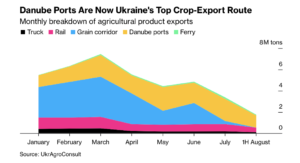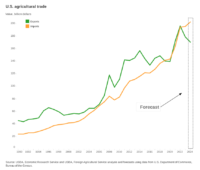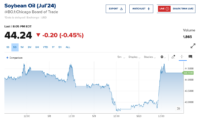Bloomberg's Clarice Couto reported this past Friday that "a surprising tax change in agriculture powerhouse Brazil has the potential to make soy grown in the world’s largest bean exporter less…
Black Sea Grain Deal Renewal Still on Hold After Turkish, Russian Talks
Financial Times writers John Paul Rathbone and Roman Olearchyk reported on Sunday that, “Russian forces launched a massive drone attack on Ukraine’s southern Odesa port region in the early hours of Sunday, a day before the Turkish and Russian presidents were due to hold talks about restarting the export of grain via the Black Sea.”
The FT article noted that, “‘Russian terrorists continue to attack port infrastructure in the hope that they will be able to provoke a food crisis and hunger in the world,’ Andriy Yermak, chief of staff of Ukrainian president Volodymyr Zelenskyy, wrote on Telegram.”
Rathbone and Olearchyk explained that, “After Russia refused to renew the deal, Ukraine has steadily increased the amount of grain it exports via the Danube ports, or overland by rail and truck, to about 36mn tonnes.
“Kyiv has also tested Russia’s de facto blockade of Ukraine’s Black Sea by carving out a ‘humanitarian’ corridor, a route that hugs the Odesa coastline until ships reach the safe waters of Nato members Romania and Bulgaria.
“Two commercial vessels transporting metallurgical goods safely completed the trip this weekend.”
Late last month, two other ships also successfully navigated the “humanitarian corridor.”
On Monday, Financial Times writers Courtney Weaver, Adam Samson and Ayla Jean Yackley reported that,
Turkish president Recep Tayyip Erdoğan said he was confident Russia would ‘soon’ revive the Black Sea grain deal, even as Vladimir Putin insisted that Moscow would not re-join the initiative until the west met Russian’s demands.
“Speaking at a joint press conference in the Russian city of Sochi, Putin said ‘We are ready to go back to the deal as soon as [Russia’s] obligations are fulfilled,’ while insisting the west had ‘betrayed’ its commitments.
“Erdoğa said Turkey had been working alongside the UN on ways to revive the accord. ‘I hope the new work of the UN will yield results. As Turkey, I believe we will reach a solution that will meet expectations soon,’ he said.”
Also Monday, Wall Street Journal writer Georgi Kantchev reported that, “President Vladimir Putin said Russia won’t rejoin a deal enabling Ukrainian grain to be shipped globally until the West meets its demands to facilitate Russian agricultural exports, after quitting an agreement that guaranteed the safety of a crucial part of the global food supply chain.”
The Journal article indicated that, “Moscow has said that a key reason for its withdrawal from the grain deal was that its own food and fertilizer exports were hampered by international sanctions. Western countries haven’t sanctioned those exports, but sanctions might have created obstacles to financing and shipping Russian agricultural products, U.N. officials have said.”
And New York Times writers Paul Sonne, Gaya Gupta and Safak Timur reported this week that, “President Vladimir V. Putin of Russia restated his opposition on Monday to the internationally backed Black Sea grain deal, a sign that little progress had been made toward reviving the agreement after bilateral talks with his Turkish counterpart, Recep Tayyip Erdogan.
“Amid an international push to revive the deal, which Turkey helped broker and which had allowed Ukraine to safely export tens of millions of tons of grain through the Black Sea, Mr. Putin reiterated a litany of complaints about the accord and said that Russia was prepared to re-enter it only after Western nations addressed its concerns.”
Elsewhere, Bloomberg writer Kateryna Choursina reported on Friday that, “The Ukrainian grain industry is lobbying the governments of Ukraine and Romania to set up anchorage areas in the waters of both countries to help increase outbound grain shipments via the Danube River.
“The Danube has become Ukraine’s main crop-export route after the country’s Black Sea ports were closed in the wake of Moscow’s move in July to pull out of a pact that provided a safe corridor for shipments.”

The Bloomberg article added that, “Ukraine needs to ship at least 4 million tons of grains and oilseeds a month because of a better-than-expected harvest, said Mykola Gorbachov, president of the Ukrainian Grain Association. Anchor stations that allow ships to be loaded from barges directly at sea may add as much as 1 million tons of grain export capacity to ports on the Danube, he said in an interview this week.”
And Reuters writer Pavel Polityuk reported this week that, “The forecast for the combined grain and oilseeds 2023 harvest outlook for Ukraine has been increased by 3.7 million metric tons to 80.5 million tons, grain traders union UGA said on Monday.
“‘The increase in this year’s harvest forecast is due to favourable weather conditions and better-than-expected crop yields,’ UGA said in a statement.”







